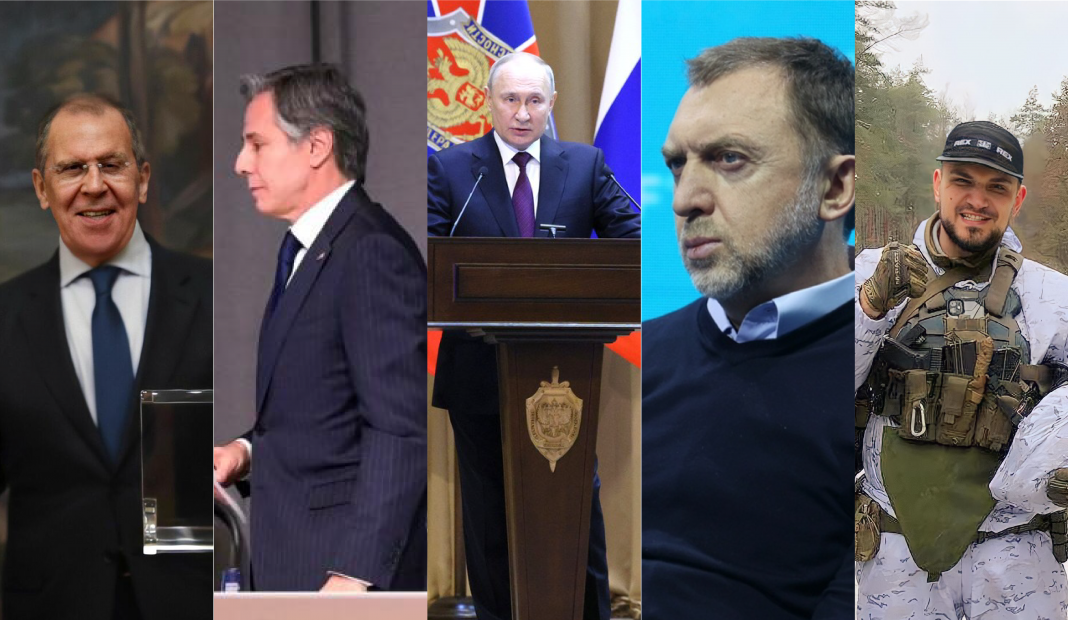This report describes the key events that had an important impact on the political, economic and social processes inside Russia.
Based on the results of the past week, the following key events can be brought to attention:
- Moscow is increasingly noticeably strengthening the negotiating line with the West, returning to the issues of strategic stability and the new world order. It isn’t easy to talk about the contours of possible agreements, but it is still worth paying attention to strengthening contacts at different levels. Western isolation of Russia is faced with the understanding that even with the complete absence of Moscow’s economic interests in Europe, it is necessary to consider the formation of new anti-Western alliances in Asia, which will soon be one of the main challenges for democracy.
- The Kremlin is returning to the idea of reformatting the so-called “special military operation” into an “anti-terrorist operation.” This is evidenced by the strengthening of the positions of the FSB, as well as the significant activation of Putin in the role of leader of all processes in this structure. Even though Alexander Bortnikov remains in his post, several key operatives of the FSB are still under Putin’s control. A situation arises when, with the unsatisfactory work of the Ministry of Defense, Putin bets on the FSB.
- Russia is building new diplomatic ties and strengthening anti-Western nodes in Asia, Africa and Latin America. The visits of Lavrov, Patrushev and other high-ranking officials to the countries of the regions mentioned above demonstrate Russia’s desire to show the West that international relations work in the face of an increasingly noticeable split between the West and the East. At present, we continue to calculate Russia’s losses from the severance of ties with Europe. Still, if its economy holds up, then in a few years, we will witness a global shift of economic zones to the East, which may also play into Moscow’s hand. At the same time, it is already becoming clear that Russian oligarchs are increasingly thinking about such forecasts.
During February 27th – March 5th the following topics were the most relevant for Russia:
1. Putin’s speech on the meeting the board of the Federal Security Service (FSB)
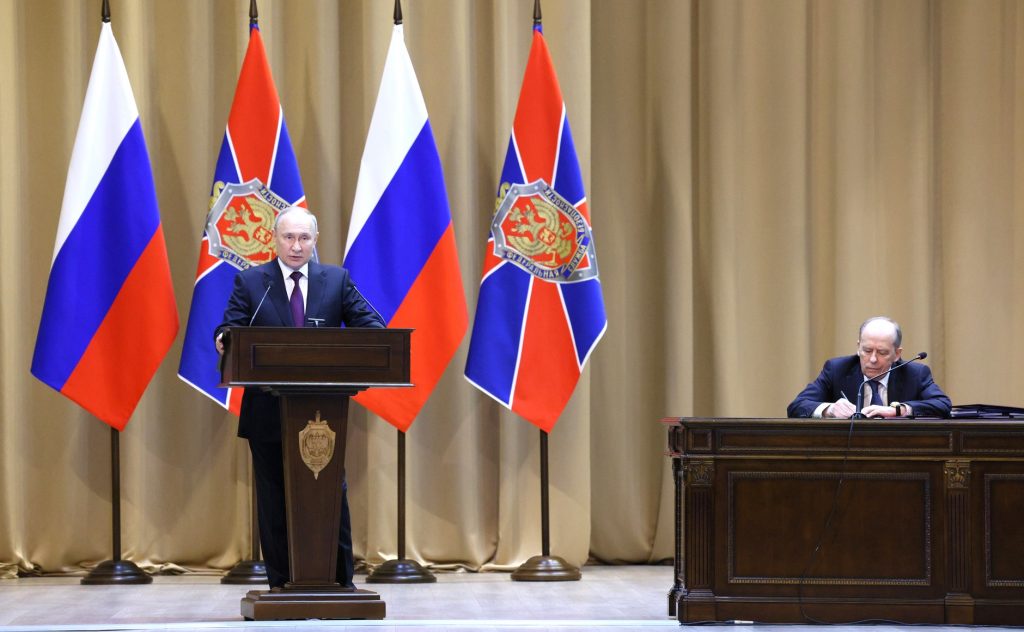
On Tuesday, February 28, Vladimir Putin took part in an expanded meeting of the board of the Federal Security Service. On the eve of Putin’s press service, they said that the collegium would sum up the operational and service activities of the FSB in 2022 and also determine priority tasks for 2023. Also, Putin’s press secretary Dmitry Peskov said that “there will be a large, voluminous speech by the director of the FSB, Alexander Bortnikov, in the presence of the president, behind closed doors. The value of the service at the current moment is difficult to overestimate, so there will be a serious conversation. This collegium of special services was the first since the start of Russia’s full-scale invasion of Ukraine.
Putin’s key theses:
- “I would like to note that 2022 was a special year for the whole country and your service.”
- “First of all, it is necessary to continue to assist the Armed Forces and the National Guard in solving the problems of the [so-called] “special military operation”, including counterintelligence support for military formations and the rapid exchange of operationally significant information.”
- “Increased attention should be paid to the formation of security agencies in the [self-proclaimed] “DPR”, “LPR”, [temporarily occupied] Zaporizhzhia and Kherson regions. It is necessary to strengthen their operational and personnel potential, to equip them with the most modern equipment.”
- “The Russian-Ukrainian section of the state border should be under special control of the FSB Border Service. Your task is to put a barrier on the way of sabotage groups, to stop attempts to transport weapons and ammunition into the territory of Russia illegally.”
- “It is necessary to generally strengthen the line of counterintelligence because Western intelligence agencies have traditionally, always actively worked “in Russia”, and now they have thrown additional personnel, technical and other resources against us. So we need to respond appropriately.”
- “Against us, they always use what is at hand, what is possible, and then they use it. It’s always been that way and the way it is now.”
- “Extremism should be counteracted just as actively. Unfortunately, such crimes have also increased over the past year.”
Outcomes and outlook:
Many experts expected that the Board would decide on the resignation of FSB Director Alexander Bortnikov (this event has been expected since November 2021, when Bortnikov turned 70 years old). Bortnikov’s possible successor, General Sergei Korolev, has long been mentioned in circles around the Kremlin. But that did not happen.
The meeting of the Board and the emphasis placed on the fight against extremism and sabotage show that this topic worries Putin. In addition, Putin wants to show that the special services (in particular, the FSB) are under his control (the collegium was held at a time when the Secretary of the Security Council of the Russian Federation, Nikolai Patrushev, was on a visit abroad; namely, Patrushev is considered the “grey eminence” of the FSB. Thus, Putin sends a signal: no war of the “Kremlin towers” affects the work of the special services, and there is no “front of the security forces” and other “horror stories” that have recently been launched into the media space. There is Putin’s control.
The strengthening of this thesis may also indicate a partial change in the strategy towards Ukraine. Since last week we have been witnessing the activation of the FSB in the fight against extremism and terrorism. Therefore, shortly, we should expect the publishing of several publications about prevented terrorist attacks on the territory of Russia, as well as the disclosure of sabotage groups with supposedly Ukrainian roots. In this situation, we can even talk about changing the format of the so-called “SMO” to an “anti-terrorist operation” (which was previously stated by many sources). At the same time, we should expect a change in narratives in the public plane, including in the international arena.
2. Visit of Nikolai Patrushev to Algeria, Venezuela and Cuba
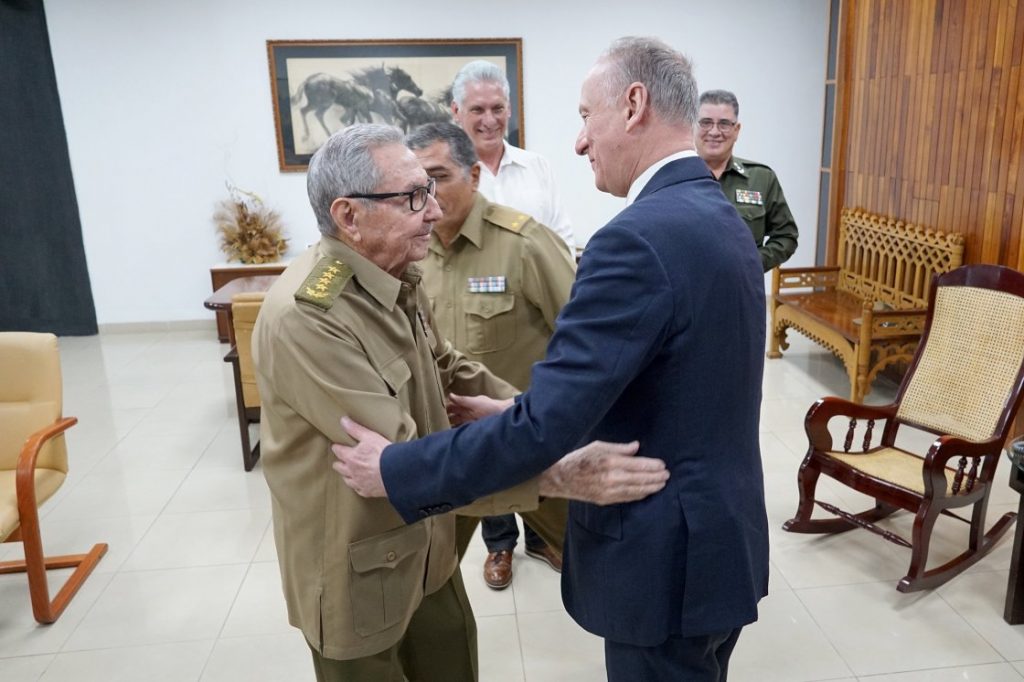
Last week, Secretary of the Security Council of the Russian Federation Nikolai Patrushev visited Algeria, Venezuela and Cuba, where he held meetings with their leaders and other government officials. According to the press service of the Security Council of the Russian Federation, all the work mentioned above visits by Nikolai Patrushev were carried out to discuss issues of cooperation between law enforcement agencies and special services, as well as issues of cooperation in the field of security.
Timeline:
- On February 27, Patrushev arrived in Algeria. He met with the Chief of the General Staff of Algeria, Said Shenegrikha, and the Director General of the General Directorate of Documentation and External Security of Algeria, Mikhen Dzhebbar. According to official information, issues of interaction between law enforcement agencies and special services and other matters of Russian-Algerian cooperation in security were discussed at the meetings.
- Patrushev met with the President of Algeria, Abdelmajid Tebbunomhode, during which issues of Russian-Algerian cooperation in various fields were discussed. During the meeting, Patrushev noted that Russia views Algeria as one of its key foreign policy partners, stressing that the two countries positions are close or coincide on most issues on the international and regional agenda.
- On March 1, Nikolai Patrushev arrived on a working visit to the Venezuelan capital of Caracas, where Russian-Venezuelan security consultations were held. The event was attended by the Secretary General of the National Defense Council of Venezuela, Jose Ornelas Ferreira, as well as representatives of the ministries and departments of the two countries. According to the Security Council of the Russian Federation press service, special attention was paid to counteracting “colour revolutions” and cooperation in the field of information security.
- Patrushev held a meeting with the President of the Bolivarian Republic of Venezuela, Nicolás Maduro, during which issues of Russian-Venezuelan cooperation, including in the security field, were discussed. Also, during the meeting, Patrushev stressed that Russia and Venezuela are bound by strong ties of friendship and time-tested strategic partnership relations. According to him, the interaction between Russia and Venezuela on the world stage remains essential in ensuring international security and stability.
- On the same day, Patrushev travelled to Cuba, where Russian-Cuban security consultations were held with the participation of Cuban Interior Minister Alvarez Casas. The press service of the Security Council of the Russian Federation also noted that during the consultations, emphasis was placed on the joint efforts of Russia and Cuba to counter the “colour revolutions” and the destructive activity of non-governmental organizations. Also, there was a speech about cooperation in education, economy and scientific and technical activity.
- On March 2, Patrushev met with Cuban President Miguel Diaz-Canel and the leader of the Cuban revolution Raul Castro. According to the official statements of the parties, various issues aimed at deepening Russian-Cuban relations were discussed at the meeting. In addition, the strategic priorities of cooperation between Russia and Cuba and the problems of the international agenda were discussed in detail.
Outcomes and outlook:
Nikolai Patrushev’s visit, like the visit of Russian Foreign Minister Sergei Lavrov to the Sahel countries two weeks earlier, is designed to demonstrate Russia’s interest in African and Latin American countries. Russia shows that it has not given up its hegemonic status and will try to actively promote its interests far beyond its borders.
In this regard, a trip to Algeria is essential. The state most recently (in 2019) experienced significant political unrest. Traditionally, the interests of the West (USA, France) and the East (Russia, China) clash around Algeria. Algeria ranks 4th in terms of gas exports, including to Europe. Algeria also ranks 5th in the world in terms of proven oil reserves. Relations with Algeria and a coordinated policy in the energy sector are essential for Russia, primarily to maintain consistently high energy prices.
In addition, Algeria is a key state in the Maghreb region, which allows it to seriously influence the situation in neighbouring states – Mali, Niger and Libya, where Russia traditionally has serious military-political and economic interests.
Energy issues also dictate the visit to Venezuela. In addition, it was important for Patrushev to negotiate with the Venezuelan leadership after the United States partially eased sanctions pressure on Venezuela at the end of 2022. Washington must agree with Caracas on increasing oil production and regional cooperation. Moscow needs to prevent this.
The visit to Cuba was more symbolic and intended to show that relations between Moscow and Havana remain invariably warm even after the departure of the Castro brothers from the political arena. In addition, Patrushev’s visit took place shortly after the 60th anniversary of the Cuban Missile Crisis was celebrated. In fact, with his visit to Cuba, Patrushev once again updated the famous slogan in Russia “We can repeat it.” However, this visit was addressed instead to the United States and was primarily politically important.
In general, such visits by high-ranking Russian officials are intended to demonstrate the formation of a new anti-Western knot in the geopolitical arena. Russia significantly increased the emphasis on the fact that not all states supported the idea of isolating Moscow, actually speaking out against the interests of Washington. Of course, such actions are designed for a long-term effect, which may manifest in a few years. Also, it is worth paying attention to the activation of China, which is likely to strengthen its presence in such unions after the end of two critical events in the political life of China – the National People’s Congress (NPC) and the Chinese People’s Political Consultative Conference (CPPCC).
3. Sergei Lavrov’s visit to Azerbaijan
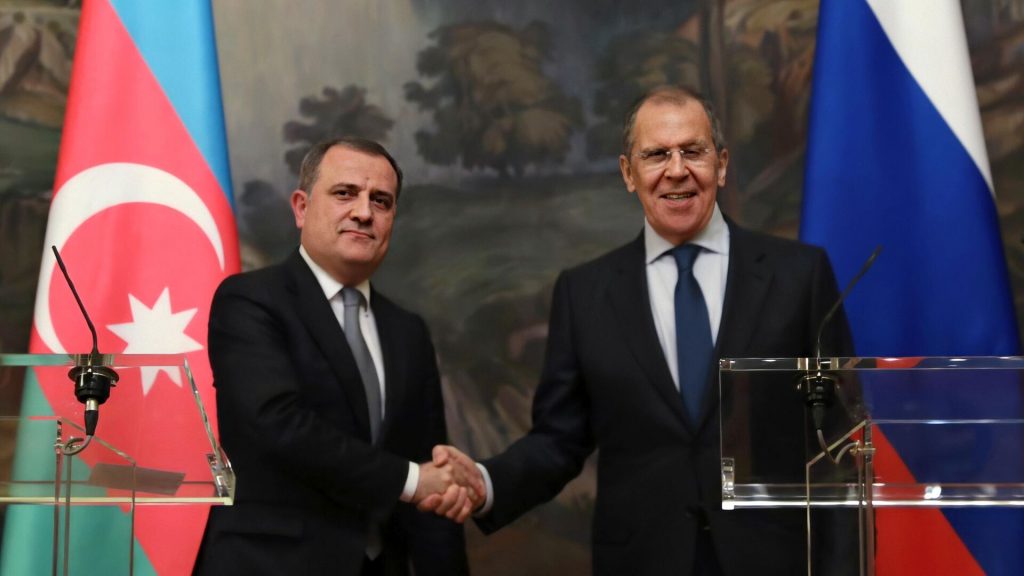
On February 27-28, Minister of Foreign Affairs of the Russian Federation Sergey Lavrov paid an official visit to Azerbaijan. This trip was timed to coincide with the first anniversary of the signing at the highest level of the Declaration on Allied Cooperation between Russia and Azerbaijan (February 22, 2022). This document provides for strengthening coordination in international affairs and military-political cooperation, joining forces in countering the terrorist threat, building up economic cooperation and expanding dialogue in the humanitarian sphere. In addition, Lavrov met with President of Azerbaijan Ilham Aliyev, Minister of Foreign Affairs of Azerbaijan Jeyhun Bayramov, took part in the third meeting of the Russian-Azerbaijani Expert Council, and also held a final press conference.
Timeline:
- On February 27, Sergei Lavrov met with Azerbaijani President Ilham Aliyev. Main theses:
- “Certainly, the trade turnover – a characteristic of our economic cooperation – is reaching a record level.”
- “We appreciate your attention and your government to the support of the Russian language, to the composition of all conditions for all willing citizens of Azerbaijan to use the opportunity to speak and work in Russian themselves, and provide such an opportunity to their children.”
- “Undoubtedly, regional security remains a topical issue in our relations, both bilaterally and multilaterally. As a result, many international colleagues, including those far from this region, are showing a keen interest in helping move towards a settlement between Azerbaijan and Armenia.”
- On February 28, Sergei Lavrov held a meeting with the Minister of Foreign Affairs of Azerbaijan, Jeyhun Bayramov, and a joint press conference following the meeting. Main theses:
- “We highly appreciated the bilateral political dialogue, primarily at the highest level, where the main directions of further work are determined.”
- “We are pleased with the deepening of inter-parliamentary ties.”
- “According to all forecasts, by the end of the year, a record volume of trade turnover of $4 billion is expected.”
- “Russian economic operators are ready to continue actively involved in the post-conflict reconstruction of Azerbaijani territories.”
- “We are mutually satisfied with the deepening of exchanges between the youth of the two countries.”
- “We discussed the preparations for the 21st Intergovernmental Commission on Economic Cooperation meeting scheduled for April 2023 in Moscow.”
- “Today, we discussed measures to strengthen peace, security and stability in the South Caucasus. In addition, we discussed issues of Armenian-Azerbaijani normalisation.”
- “As for the Lachin corridor, the answer is simple. First, its mode of operation must fully comply with the first tripartite statement of November 9, 2020, which means the need to ensure free movement for exclusively civilian and humanitarian cargo and civilians.”
- “As for the announcements from Brussels, we cannot comment on this in detail. However, we see how the European Union openly abuses its relations with Armenia and Azerbaijan, including pushing through its “mission” on the territory of Armenia, which raises serious doubts regarding legitimacy.”
- Sergey Lavrov took part in the third meeting of the Russian-Azerbaijani Expert Council. Main theses:
- “Today, relying on the richest intellectual and practical heritage of G. A. Aliyev, an unprecedented level of mutual trust has been achieved between our presidents.”
- “Russia is one of the top three trading partners of Baku, while it ranks first in imports of non-hydrocarbon products.”
- “Our plans include the implementation of large-scale joint projects that have a regional and a global dimension. First of all, this is the further expansion of the North-South international transport corridor, including, as you well know, the Rasht-Astara section.
- “Russia is interested in a peaceful, stable, prosperous South Caucasus. In this regard, we are actively working to reconcile the two fraternal peoples: Azerbaijani and Armenian.”
- “Sometimes it seems that some external, extra-regional players offering their services consider the situation an occasion for regular geopolitical games not in favour of the general benefit, but in their interests.”
Outcomes and outlook:
Sergey Lavrov’s visit to Azerbaijan occurred immediately after a meeting between Armenian Prime Minister Nikol Pashinyan and Azerbaijani President Ilham Aliyev in Munich, mediated by the US Secretary of State. The two leaders’ meetings turned out to be quite fruitful, and experts started talking about reducing Russia’s role in the region. Lavrov wanted to demonstrate with his visit that the South Caucasus would continue to be a sphere of Russia’s interests. Moreover, Lavrov is considered the leader of the “pro-Armenian” party in the top leadership of Russia, and his visit to Baku was supposed to improve relations with Azerbaijan and show Moscow’s equidistance from the processes in the region.
For Russia, Azerbaijan is also an important partner in resolving issues of joint policy in the Caspian. Moreover, the Azerbaijani issue is significant from the point of view of Russia’s natural ally – Iran. Azerbaijan also has a unique relationship with Turkey. In such a situation, Russia needs to demonstrate the stability of relations with Azerbaijan. Moreover, Aliyev has recently shown a relatively high level of independence in decision-making, and Azerbaijani energy corporations often compete with Russian ones in foreign markets.
Also, recently in the Caspian region, there has been an increase in the confrontation between Azerbaijan and Iran, which, in the event of an escalation, could lead to the disruption of any joint projects in the entire region. Lavrov tried to act as an intermediary between Baku and Tehran to settle possible conflicts and prevent external provocations.
4. Sergei Lavrov’s visit to India
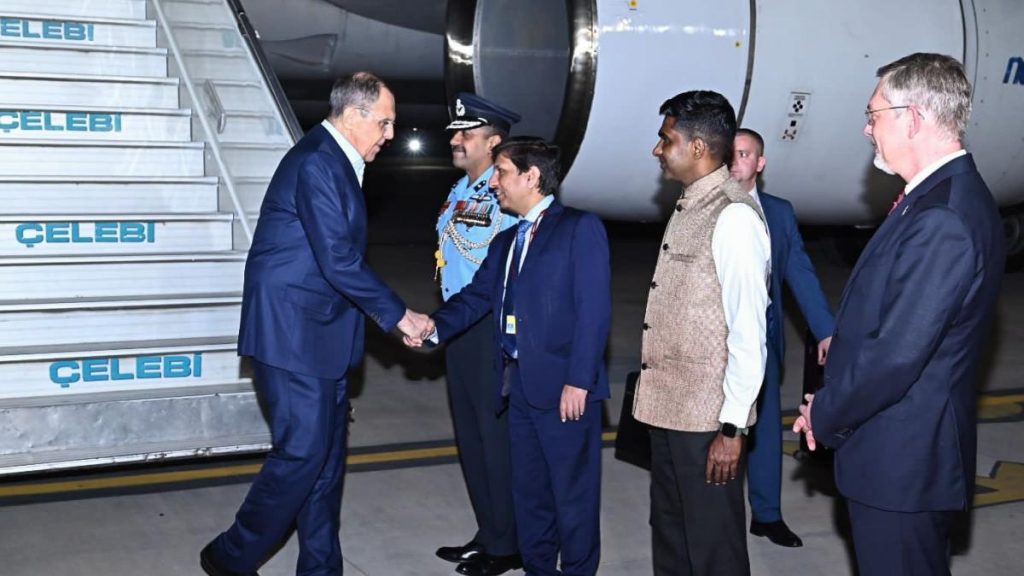
On March 1-3, Minister of Foreign Affairs of the Russian Federation Sergey Lavrov paid a working visit to India, where he took part in the meetings of the G20 Foreign Ministers, held meetings with the Foreign Ministers of India, Turkey, Brazil, China, and also took part in the central Indian conference on geopolitics and geoeconomics “Raisina Dialog”.
Timeline:
- On March 1, Sergei Lavrov held talks with Indian Foreign Minister Subrahmanyam Jaishankar. The parties reaffirmed their focus on further strengthening the specially privileged strategic partnership in all areas. They emphasised the mutual desire to increase coordination in the international arena and multilateral formats, primarily in the UN and on the platforms of the SCO, BRICS and the G20. We reaffirmed our joint commitment to forming a polycentric world order based on fair and democratic principles and the rule of law.
- Sergei Lavrov held a meeting with Turkish Foreign Minister Mavlut Cavusoglu, during which they discussed cooperation in the trade and economic sphere, including measures to assist Turkey in eliminating the consequences of the earthquake. When talking about the prospects for the implementation of the Black Sea Grain Initiative, the Russian side emphasised that the continuation of the “package” agreement on grain is possible only if the interests of Russian producers of agricultural products and fertilisers in terms of unhindered access to world markets are taken into account. The issue of Syria was also discussed.
- Sergei Lavrov held a meeting with Brazilian Foreign Minister Mauro Vieira. They reaffirmed their focus on strengthening the entire range of Russian-Brazilian strategic partnership relations and discussed a schedule of bilateral contacts at various levels.
- On March 2, Sergey Lavrov held a meeting with the Minister of Foreign Affairs of the People’s Republic of China, Qin Gang, during which the current situation around Ukraine was discussed, including the position of the Chinese Foreign Ministry on a political settlement of the problem. Also, the parties expressed their unanimous rejection of attempts to interfere in the internal affairs of other countries, the imposition of unilateral approaches through blackmail and threats, and opposition to the democratisation of international relations. During the meeting, the ministers signed the Consultation Plan between the Russian and Chinese Foreign Ministry for 2023.
- Speaking at the G20 Foreign Ministers’ Meeting, Sergey Lavrov made many statements:
- I would like to apologise to the Indian presidency and colleagues from the countries of the global South for the indecent behaviour of several Western delegations, who turned the work on the G20 agenda into a farce in an attempt to shift their responsibility for failures in economic policy to others, primarily to Russia.
- Aggressive Russophobia looks particularly outrageous when one remembers that never have Western members of the G20 lamented at its meetings over the many hundreds of thousands of victims of Washington’s adventures in the Middle East under the pretext of threats to national security ten thousand miles from the US borders.
- We see no alternative to the only legitimate world order embodied in the basic principles of the UN Charter.
- The formation of a polycentric world requires the recognition of civilisational diversity and mutual respect for interests. It is necessary to abandon the flawed logic of domination, diktat and sanctions. We welcome the rise of new centres of influence in Asia, the Middle East, Africa, and Latin America.
- We will strive for the democratisation of economic governance. We support the membership of the African Union in the G20.
- Shocked by the unpunished sabotage against the Nord Stream gas pipelines in the area of NATO and the EU’s responsibility. We insist on an honest and prompt investigation of this act of terrorism with the participation of Russia and other interested parties.
- Today, the lion’s share of grain supplies from Ukraine goes at dumping prices for fodder to the European Union and not to the poorest countries.
- Unfortunately, the Declaration could not be approved by all G20 ministers. Our Western colleagues, just like a year ago (under the Indonesian presidency), tried by hook or by crook (primarily the second one) and various rhetorical statements to bring to the fore the problem of the situation around Ukraine, which they serve under the sauce of “Russian aggression”.
- On March 3, Sergei Lavrov participated in the Raisina Dialog conference, where he spoke about Russia’s war against Ukraine. In particular, Lavrov said that the war was started not by Russia but by Ukraine: “The war that we are trying to stop, which was launched against us using the Ukrainians,” – those present in the hall laughed at this phrase – after a short pause, Lavrov continued: “it was reflected on Russian policy, including energy. A clear example of change is that we no longer rely on any partnerships in the West.”
Outcomes and outlook:
For Russia, the G20 forum is one of those platforms that it can (and quite effectively) use to convey its position. Moreover, the fact that Russia has not shaken hands at many forums makes Russian diplomats pay serious attention to G20 meetings.
The current forum at the level of foreign ministers has once again demonstrated the deep division of the world into West and East. At the same time, Russia is trying with all its might to assume the role of the “leader of the global East” (Russia’s economic “lightness” in comparison with other G20 countries is compensated by political and military activity). The fact that the final Declaration was blocked is the most critical indicator of the existing split.
Russia continues to actively promote its vision of the situation in Ukraine (refusing to consider its behaviour as aggression). The West is trying to build the entire political agenda around aggression, including replacing economic and social issues. The East tacitly supports Russia, not because it shares Russia’s position but because of collective considerations of a geopolitical and economic nature.
At the same time, one should not focus on the audience’s reaction to Lavrov’s statements about the events in Ukraine. Behind such ridicule goes unnoticed the more dangerous game of Russia, which is to increase communication with those states that remain neutral regarding Moscow’s actions. In particular, Lavrov’s meetings with representatives of China, Brazil, India and several other countries demonstrate that the anti-Western coalition is working and creating more and more threats to the “collective West.”
5. A meeting between Sergei Lavrov and Anthony Blinken during G20
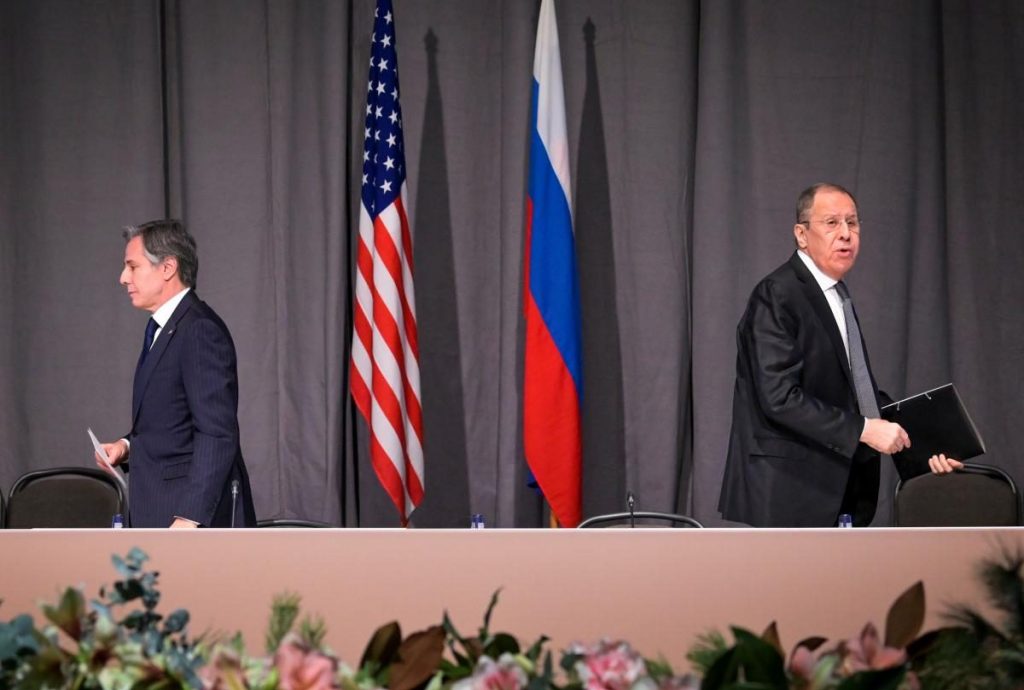
During the G20 Foreign Ministers Summit, which took place in New Delhi, an unscheduled meeting was held between Russian Foreign Minister Sergei Lavrov and US Secretary of State Anthony Blinken. According to the statement of the American side, the conversation lasted about 10 minutes and was based on the theme of Russia’s war against Ukraine and the Strategic Offensive Arms Treaty. This meeting was the first since the beginning of Russia’s invasion of Ukraine.
Key points:
- Anthony Blinken, in a media commentary, said he “told the Foreign Secretary to put an end to this aggressive war, to engage in meaningful diplomacy that can lead to a just and lasting peace.”
- Reuters reported that Blinken asked Russia to reconsider its decision to suspend participation in the Strategic Arms Treaty (START) and called for the release of Paul Whelan, an American in a Russian colony.
- The official representative of the Russian Foreign Ministry, Maria Zakharova, confirmed the fact of this conversation. According to her, the meeting was requested by the American side.
- Zakharova stated that the release of Paul Whelan was not discussed.
- On March 3, answering journalists’ questions, US State Department spokesman Ned Price said: “I know the Russians attach great importance to this. But it was a short meeting. We have nothing to apologise for.”
Outcomes and outlook:
Today, any contact between the Russian and American sides is of considerable interest to the media and the expert community. Moreover, the meeting between Blinken and Lavrov, despite its transient nature, took place at an exciting time: some sources speak of a series of negotiations between the Russian Federation and the United States in Vienna; in January, the CIA chief visited Russia, in late February the US President visited Kyiv (his visit coordinated by the special services of Russia and the United States). As a result, the media space began to actively consider options for ending the war in Ukraine.
That is why it is clear that the communication between the two heads of foreign affairs departments went beyond the framework outlined by Blinken. It is clear that the parties are preparing to re-sign the Treaty on Strategic Offensive Arms, including with the involvement of other nuclear states. Still, no one removed the “strategic stability” issue from the agenda because of the backsliding on which the war in Ukraine began (and without a solution for which it cannot end).
In the current situation, one has to state that any diplomatic contacts between Moscow and Washington should be welcomed, primarily if they are held constructively.
6. Invasion of “Ukrainian” saboteurs into Bryansk region
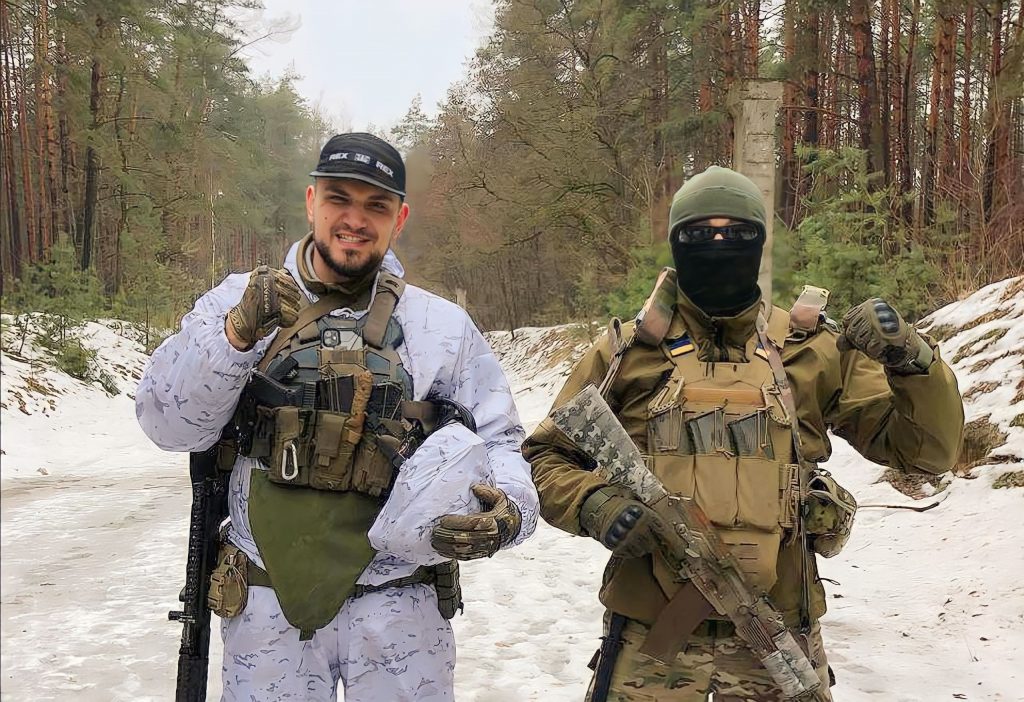
On Thursday, March 2, information began to appear in the Russian media about a group of Ukrainian saboteurs who entered the territory of the villages of Lyubechany and Sushany, located in the Bryansk region of Russia, on the border with Ukraine. It is noteworthy that media reports featured extremely controversial news about the alleged hostage-taking of residents, the presence of wounded and dead (including children), an accident at an electrical substation and the explosion of a Ukrainian drone. At the same time, the FSB stated that in the Klimovsky district of the Bryansk region of the Russian Federation, together with the forces of the Ministry of Defense, the special service allegedly carried out “measures to destroy armed Ukrainian nationalists who violated the state border.”
Sometime later, the “Russian Volunteer Corps” issued a statement, allegedly recorded in the village of Lyubechany, where he called on the Russians to revolt. Later, this organisation took responsibility for the operation. Its head, Denis Nikitin, said that about 45 people participated in the process, and all actions were coordinated with the Ukrainian military and official authorities.
Outcomes and outlook:
The raid of the “Kapustin group” (“Russian Volunteer Corps”) was more of a propaganda nature. It is still difficult to determine whether this was a provocation organised by the Russian special services or a sortie initially prepared by the Ukrainian side. The only result of this sabotage operation was that the “Russian Volunteer Corps” was discussed in the media. Kapustin is giving interviews, and in Russia itself, measures of increased caution are being taken. The Ukrainian press (as well as some in the West) write that the raid of saboteurs is “the beginning of the collapse of Russia” and “the beginning of the struggle of the peoples of Russia with the regime.”
Such attacks, accompanied by sabotage, are expected to become more frequent shortly. This will lead to an even more significant “tightening of the screws” inside Russia, strengthening the power structures and the activity of anti-terrorist networks. For example, a few days later, an attempt to blow up the car of a well-known politician and businessman Konstantin Malofeev was suppressed in Russia.
In Russia, against the backdrop of attacks by saboteurs, a new ideological line begins to unwind: saboteurs kill and terrorise the civilian population; they use methods militants of the Ukrainian Insurgent Army used in Ukraine in the 1940s and 1950s. In this regard, it is especially noteworthy how actively the Russian media space promotes the boy Fyodor, whom saboteurs wounded.
7. A meeting of the Security Council of the Russian Federation
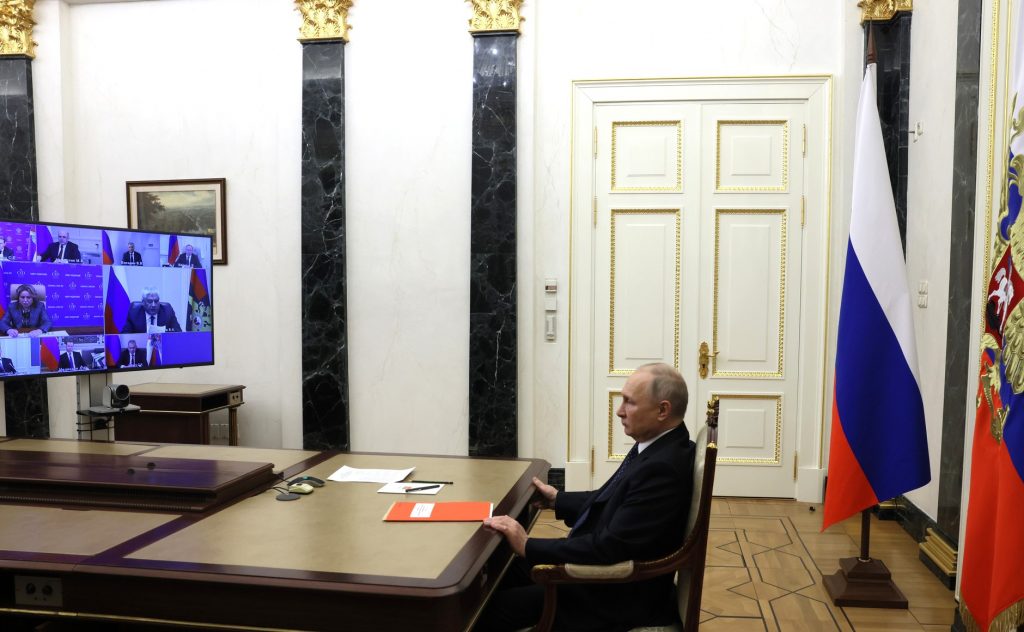
On Friday, March 3, a meeting was held via videoconference with the permanent members of the Security Council of the Russian Federation. The meeting was attended by Prime Minister Mikhail Mishustin, Chairman of the Federation Council Valentina Matvienko, Chairman of the State Duma Vyacheslav Volodin, Deputy Chairman of the Security Council Dmitry Medvedev, Chief of the Presidential Administration Anton Vaino, Interior Minister Vladimir Kolokoltsev, Defense Minister Sergei Shoigu, Director of the Foreign Intelligence Service Sergei Naryshkin, Special Representative of the President for Environmental Protection, Ecology and Transport Sergey Ivanov. Notably, Nikolai Patrushev, Secretary of the Security Council of the Russian Federation, was absent in connection with a working visit to Cuba.
Timeline:
- Putin: “Today we have one, but a fundamental question about measures for the anti-terrorist protection of facilities under the jurisdiction of law enforcement agencies.”
- Vladimir Kolokoltsev, Head of the Ministry of Internal Affairs of the Russian Federation, announced a closed report.
- It is noteworthy that there was no open part of the meeting this time. As well as any statements following the meeting.
Outcomes and outlook:
Apparently, Russia needs anti-terrorist rhetoric to be able to change the contour of the war in Ukraine shortly – from the so-called “Special Military Operation” to the “Anti-Terrorist Operation”. In the conditions of anti-terrorist operations, several restrictions regulated by international conventions do not apply. Any support for Ukraine from the West will be regarded by Russia (and, most importantly, by its allies) as support for terrorism.
Russia will change its rhetoric and call Western countries “sponsors of terrorism.” That is, we will be dealing with largely irreversible consequences in relations between the West and the East, and regarding Ukraine, with an increase in the degree of cruelty and violence on the part of Russia. If now the main ideological line in Russia is “We are not at war with the Ukrainian people; we are at war with the Nazis, who, with the support of NATO, have seized power in the country and are terrorising the people,” then with the change in the status of the operation, the ideological line will be as follows: “We are at war with worse terrorists ISIS, and hostages inevitably die in the fight against terrorists, among which the people of Ukraine turned out to be.”
8. Deripaska’s speech at the Krasnoyarsk Economic Forum
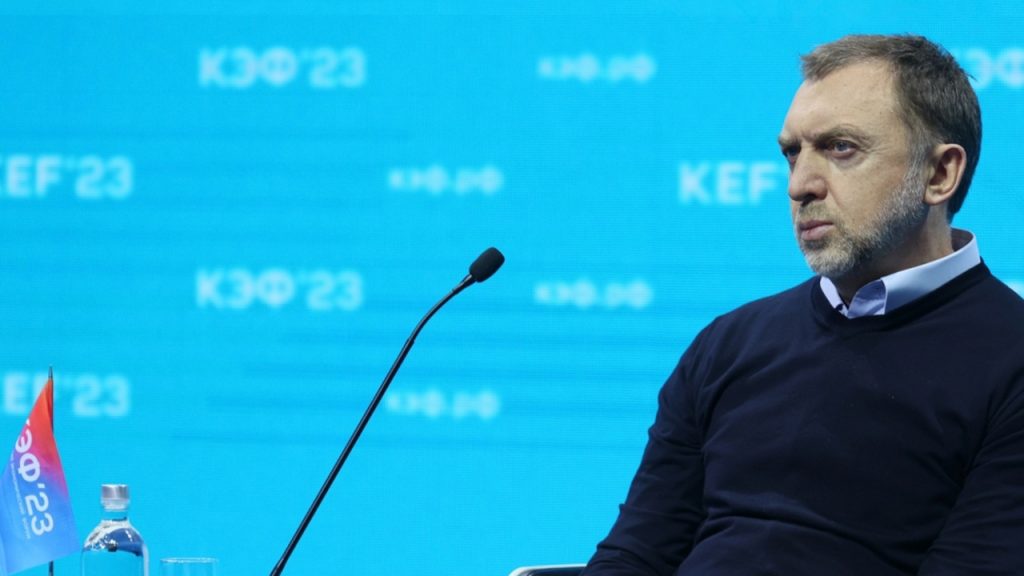
On Friday, March 3, Oleg Deripaska, Russian oligarch and founder of US Rusal and En+ Group, spoke at the Krasnoyarsk economic forum Time of Siberia, making several rather resonant statements. In particular, Deripaska announced the collapse of state capitalism and the need to reduce the state apparatus and proposed moving Russia’s capital from Moscow.
Key theses of Deripaska’s speech:
- “I think about public administration, how adequately it solves problems. This slight stress always helps cut the number of officials two or three times and reduce the number of law enforcement officers a couple of times… We understand this is a serious economic burden over which sanctions are weighted down. There is a question about this. Too much of this state apparatus and state capitalism. We need more freedom, really more freedom and competition.”
- “There won’t be any extra money next year. If we do not create conditions and ensure the attractiveness of our markets for investors, then we will discuss the same in 2033. Friendly markets are a serious resource. That’s 4.5 billion people. The rule of law and predictability is significant. If we change the rules of the game every quarter, then no one will believe us: neither Russian nor foreign entrepreneurs. Without foreign investors, there will be no money in the country.”
- “The situation is complicated and will remain difficult, I think, somewhere until mid-2025. You could say it’s unpredictable. It is necessary to enter the new markets of friendly countries – it is challenging, and the game’s rules are different. <…> There will be problems with payment schemes and organization. The sanctions pressure will be more severe.”
- “In Russia, which considered itself a European country, in the next 25 years, “they will most likely think more about their Asian past.”
- “These [Asian] markets will bring their specifics to all our issues of current life. They are already introducing specifics: if earlier on the Moscow Currency Exchange the main instrument was the dollar, the euro, now it is the yuan and settlements in yuan.”
- “State capitalism, GosGazMyas” is a road to nowhere. I am horrified to see the resources spent over the past year in vain. I used to think it was in the billions, but now, I see the bill is already in the trillions. Only the economy’s market basis, only issues regulated by the competitive environment. <…> I observe the collapse of good projects and businesses, sometimes, it’s not even a custom job, but just a machine working; it lined up and went like a skating rink. An entrepreneur is the only entity that will lead our country in these 25 years, just like Moses did in his time.”
- “I always say: it seems to be a utopia, but why do we need capital in Moscow if all our interests are in Asia? And a different time for the approach of missiles, and everything else will look different if it is located in Novosibirsk, Krasnoyarsk.
- Deripaska stressed that the main flow of investments in the future would come from Asia. In the Siberian region, it will be possible to solve issues related to economic development with the East “on the spot”: “I’m not saying that the capital should be moved tomorrow to Siberia, but sooner or later, it will have to be done.
- “We haven’t faced such challenges yet. The iron curtain has already descended. I am asked very much not to say this, but I am for peace. In three weeks, it will become clear what will happen to the banks. Let’s see who will remain from our partners. I think we’ll be shocked at how many of them are left. They can be counted on the fingers of the hand. <…> We take the crisis of 1998 and multiply it by three.”
Outcomes and outlook:
Oleg Deripaska’s speech should be viewed in the context of the brewing conflict between the system formed by Putin and the interests of big business. Deripaska is one such representative. If earlier big business was one of the regime’s foundations, now it is precisely this class demonstrating severe concern about the situation. The call for reducing the bureaucracy in Moscow itself can be perceived as a challenge.
At the same time, it is clear that big business in Russia has no illusions about returning to European and Western markets. Even the overthrow of Putin or the arrival of a democratically elected leadership will not return Western markets to the Russians in full. Therefore, Russian business reoriented to the East. And Deripaska’s call to move the capital to Siberia (the idea is by no means new – S. Shoigu and A. Kharichev voiced it last year) is evidence of an understanding of the trends occurring in society and the economy.
Russian business also understands that sanctions are long-term and is preparing for an economic crisis based on “taking the 1998 crisis and multiplying it by three.”
But it is in the environment of big business that the main potential of the future anti-Putin rebellion is concentrated today, and the problem of the West is that it does not understand this, continuing to rely on liberals and the mythical “middle class” will also be “piled up”.

